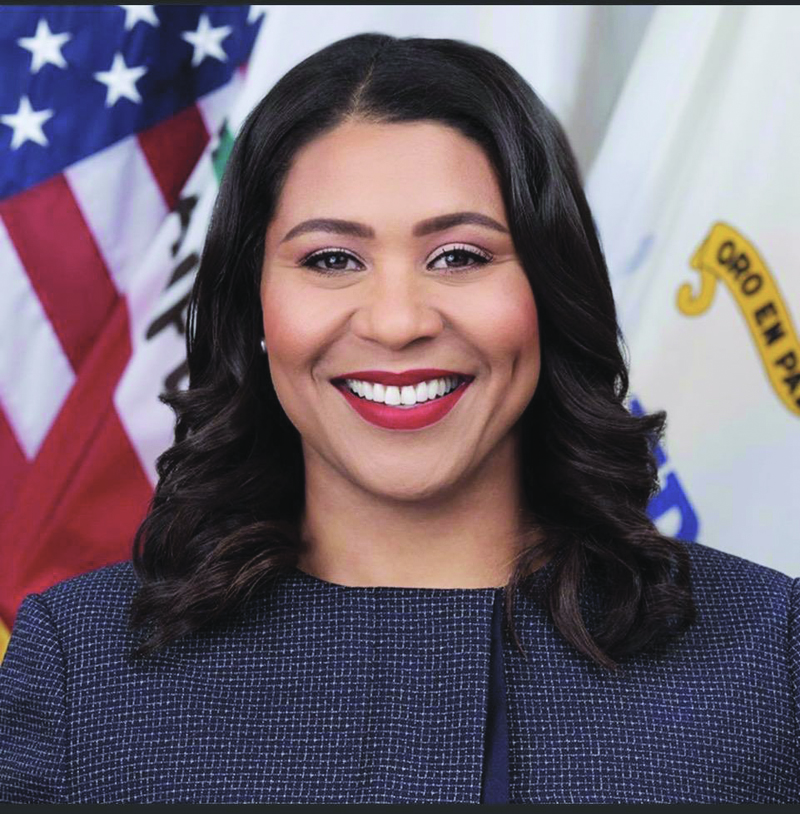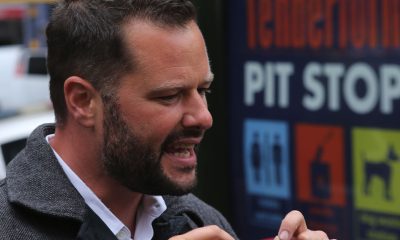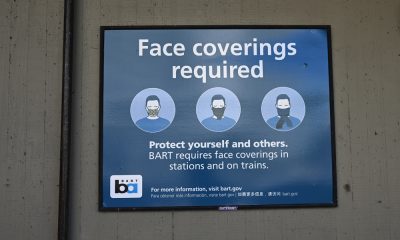Community
Mayor London Breed, Supervisor Matt Haney Introduce Legislation to Prevent Frivolous Appeals From Delaying City Projects And Policies

Legislation would raise the requirements for City projects to be appealed and allow them to continue during the appeals process to prevent unnecessary delays
On Tuesday, San Francisco Mayor London N. Breed and District 6 Supervisor Matt Haney introduced legislation designed to prevent the abuse of the appeals process for City projects and policies that often result in unnecessary delays and increased costs.
Under current law, one person is capable of appealing and pausing projects and policies related to transportation, public works, infrastructure, and the environment. The legislation maintains the ability for appeals to be filed, but raises the requirements to prevent frivolous appeals that result in project delays and cost increases.
One recent example was an appeal of the City’s Slow Streets program, which is designed to give pedestrians access to roads with limited car traffic in order to safely move around San Francisco during the global COVID-19 pandemic.
This appeal of the Slow Streets program was filed by just two individuals. While the appeal was eventually dismissed unanimously, the delay was unnecessary and resulted in hundreds of hours of staff time that could have otherwise been spent responding to other City and resident needs.
Additionally, the appeal meant countless residents in neighborhoods throughout the City did not have access to a nearby Slow Street for weeks, and in some cases months. A total of six separate appeals have been filed to stall San Francisco Municipal Transportation Agency (SFMTA) projects since June.
“Our response to the pandemic has shown that San Francisco is capable of doing great things when we don’t get in our own way,” said Breed. “People should be able to appeal projects and policies that are going to impact our city and their lives, but by setting the bar so low for an appeal to be filed, we set ourselves up for delays and cost overruns before we even get started.
“That’s a system designed to fail. This legislation allows for appeals to continue while preventing frivolous appeals that keep our city from moving forward,” Breed said.
Under the legislation, appeals to the Board of Supervisors for projects that are not directly under their decision-making authority would require 50 signatures from San Francisco residents, or five members of the Board of Supervisors, as opposed to the current rules that require just one appellant.
Furthermore, a number of project types could continue while the appeal is being heard, such as projects that are temporary in nature, involve easily reversible physical changes, or are related to health and safety.
“This is common sense, necessary legislation, only applying to public projects, that will improve our city’s ability to act decisively and respond with urgency to meet public needs, while still protecting the right to appeal,” said Haney. “The public’s right to appeal government decisions is an important part of our democracy, but a single person should not be able to completely derail a public project like Slow Streets or emergency transit lanes that fulfill a clear public purpose and can be reversed.”
“After the recent CEQA appeal that paused Slow Streets was rejected, our teams were in the streets within 12 hours and new Slow Streets were installed on Clay and Noe streets and Pacific and Tompkins avenues in less than a week,” said SFMTA Director of Transportation Jeffrey Tumlin. “These welcoming and accessible improvements are needed to keep our city moving during this crisis. With fewer frivolous appeals, staff could instead spend time on the City’s recovery.”
Under the legislation, the Slow Streets program appeal would have required 50 signatures to be filed, and implementation of the program would have been allowed to continue during the appeal since the physical changes are easily reversible and only require removing signs saying the road is closed to through traffic.
“We want to thank Mayor Breed and Supervisor Haney for their forward-thinking legislation that will help our city meet our Vision Zero and Transit First goals with urgency,” said Janice Li, advocacy director for the San Francisco Bicycle Coalition. “The San Francisco Bicycle Coalition enthusiastically supports this legislation that lets the city planners do what they do best: design safe streets that make it easier for people to walk, bike, and take transit.”
The San Francisco Mayor’s Office of Communications provided this report.
Activism
Oakland Post: Week of April 17 – 23, 2024
The printed Weekly Edition of the Oakland Post: Week of April 17 – 23, 2024

To enlarge your view of this issue, use the slider, magnifying glass icon or full page icon in the lower right corner of the browser window. ![]()
Activism
Oakland Schools Honor Fred Korematsu Day of Civil Liberties
Every Jan. 30, OUSD commemorates the legacy of Fred Korematsu, an Oakland native, a Castlemont High School graduate, and a national symbol of resistance, resilience, and justice. His defiant stand against racial injustice and his unwavering commitment to civil rights continue to inspire the local community and the nation. Tuesday was “Fred Korematsu Day of Civil Liberties and the Constitution” in the state of California and a growing number of states across the country.

By Post Staff
Every Jan. 30, OUSD commemorates the legacy of Fred Korematsu, an Oakland native, a Castlemont High School graduate, and a national symbol of resistance, resilience, and justice.
His defiant stand against racial injustice and his unwavering commitment to civil rights continue to inspire the local community and the nation. Tuesday was “Fred Korematsu Day of Civil Liberties and the Constitution” in the state of California and a growing number of states across the country.
One OUSD school is named in his honor: Fred T. Korematsu Discovery Academy (KDA) elementary in East Oakland.
Several years ago, founding KDA Principal Charles Wilson, in a video interview with anti-hate organization “Not In Our Town,” said, “We chose the name Fred Korematsu because we really felt like the attributes that he showed in his work are things that the children need to learn … that common people can stand up and make differences in a large number of people’s lives.”
Fred Korematsu was born in Oakland on Jan. 30, 1919. His parents ran a floral nursery business, and his upbringing in Oakland shaped his worldview. His belief in the importance of standing up for your rights and the rights of others, regardless of race or background, was the foundation for his activism against racial prejudice and for the rights of Japanese Americans during World War II.
At the start of the war, Korematsu was turned away from enlisting in the National Guard and the Coast Guard because of his race. He trained as a welder, working at the docks in Oakland, but was fired after the bombing of Pearl Harbor in 1941. Fear and prejudice led to federal Executive Order 9066, which forced more than 120,000 Japanese Americans out of their homes and neighborhoods and into remote internment camps.
The 23-year-old Korematsu resisted the order. He underwent cosmetic surgery and assumed a false identity, choosing freedom over unjust imprisonment. His later arrest and conviction sparked a legal battle that would challenge the foundation of civil liberties in America.
Korematsu’s fight culminated in the Supreme Court’s initial ruling against him in 1944. He spent years in a Utah internment camp with his family, followed by time living in Salt Lake City where he was dogged by racism.
In 1976, President Gerald Ford overturned Executive Order 9066. Seven years later, the 9th Circuit Court of Appeals in San Francisco vacated Korematsu’s conviction. He said in court, “I would like to see the government admit that they were wrong and do something about it so this will never happen again to any American citizen of any race, creed, or color.”
Korematsu’s dedication and determination established him as a national icon of civil rights and social justice. He advocated for justice with Rosa Parks. In 1998, President Bill Clinton gave him the Presidential Medal of Freedom saying, “In the long history of our country’s constant search for justice, some names of ordinary citizens stand for millions of souls … To that distinguished list, today we add the name of Fred Korematsu.”
After Sept. 11, 2001, Korematsu spoke out against hatred and discrimination, saying what happened to Japanese Americans should not happen to people of Middle Eastern descent.
Korematsu’s roots in Oakland and his education in OUSD are a source of great pride for the city, according to the school district. His most famous quote, which is on the Korematsu elementary school mural, is as relevant now as ever, “If you have the feeling that something is wrong, don’t be afraid to speak up.”
Community
For Cervical Cancer Month, Medical Community Focused on Education
January was Cervical Cancer Awareness Month. Physicians, advocates and others in the medical community commemorated the month by raising awareness about a form of cancer they say is highly preventable and treatable. Cervical cancer is caused by a virus called the human papillomavirus (HPV) and it develops slowly over time but can be prevented with proper care in girls as young as 13 years old.

By Magaly Muñoz
January was Cervical Cancer Awareness Month.
Physicians, advocates and others in the medical community commemorated the month by raising awareness about a form of cancer they say is highly preventable and treatable.
Cervical cancer is caused by a virus called the human papillomavirus (HPV) and it develops slowly over time but can be prevented with proper care in girls as young as 13 years old.
Sonia Ordonez, an OBGYN and gynecology surgeon at Kaiser Permanente, stated that as soon as people with cervixes reach the maturity reproductive age, they should start taking preventative measures like getting the HPV vaccine. The vaccine involves a series of two-doses for people aged 9 through 14 or three-doses for people 15 through 45 years old.
“I see a lot of young women who can’t remember or may not have gotten [the vaccine] when they were younger, or maybe got one, but we can give them the series of vaccines and restart at any point in time,” Ordonez said.
She said that cervical cancer is not the only cancer caused by HPV. Strains of the virus can also lead to throat, anal and penile cancers.
Screening is also an effective way to check for cervical cancer and should be done every three years after someone turns 21, doctors recommend. It is best to start as early as possible to catch occurrences early.
Ordonez said that this cancer is also more likely found in people of color and has led to more deaths overall.
A Mayo Clinic article published last month stated that Black women are more likely to be diagnosed and die of cervical cancer, compared to White women in the U.S.
2,000 Black women are diagnosed every year with cervical cancer and 40% die as a result.
“This disparity is not due to genetic differences among White, Black or Hispanic women, but rather related to systemic racism, access to healthcare and socioeconomic factors,” Dr. Olivia Cardenas-Trowers, a Mayo Clinic urogynecologist, said in the article.
Ordonez stated that immigrant women are also highly susceptible to the cancer, as many Latin American countries may not have accessibility to screenings or lack of insurance makes it harder for them to get tested.
Hispanic women are 40% more likely to be diagnosed with cervical cancer, and 30% more likely to die from it, as compared to non-Hispanic White women, according to the Office of Minority Health.
Family medicine physician, Joy Anyanwu, stated that the pandemic contributed to hesitancy about getting cervical cancer screenings among some women. Other factors are people’s aversion to vaccines, parents not wanting to believe that their children are or will become sexually active, and doubt about the overall effectiveness of the vaccine.
“The vaccine is very safe — over 97% effective in preventing cervical cancer,” Anyanwu said. “Even if you aren’t having sex, the earlier you start would actually help.”
Anyanwu said she understands that parents might not want to ask questions about their children’s reproductive health, but it’s a mindset that can be a barrier to having important conversation about prevention or care.
To keep families their families and communties healthy, the doctor emphasized that people should prioritize keeping up with their vaccine series and going to screenings every year.
-

 Activism4 weeks ago
Activism4 weeks agoOakland Post: Week of March 20 – 26, 2024
-

 #NNPA BlackPress3 weeks ago
#NNPA BlackPress3 weeks agoCOMMENTARY: D.C. Crime Bill Fails to Address Root Causes of Violence and Incarceration
-

 #NNPA BlackPress4 weeks ago
#NNPA BlackPress4 weeks agoFrom Raids to Revelations: The Dark Turn in Sean ‘Diddy’ Combs’ Saga
-

 #NNPA BlackPress3 weeks ago
#NNPA BlackPress3 weeks agoMayor, City Council President React to May 31 Closing of Birmingham-Southern College
-

 #NNPA BlackPress4 weeks ago
#NNPA BlackPress4 weeks agoCOMMENTARY: Lady Day and The Lights!
-

 Activism3 weeks ago
Activism3 weeks agoOakland Post: Week of March 27 – April 2, 2024
-

 #NNPA BlackPress4 weeks ago
#NNPA BlackPress4 weeks agoBaltimore Key Bridge Catastrophe: A City’s Heartbreak and a Nation’s Alarm
-

 #NNPA BlackPress4 weeks ago
#NNPA BlackPress4 weeks agoBaltimore’s Key Bridge Struck by Ship, Collapses into Water




















































